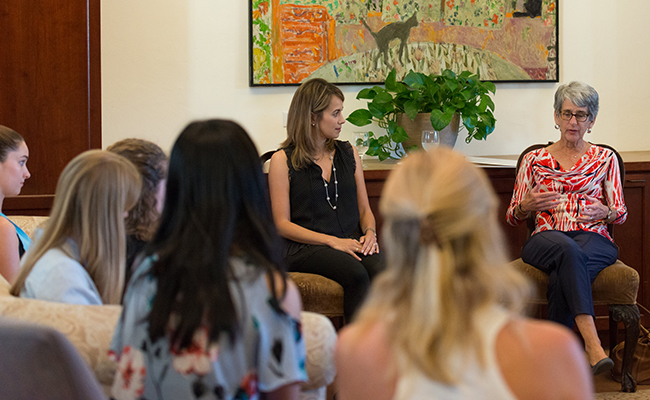
More women need to get involved in politics and have their voices heard. That was the prevailing message relayed to Scripps students during a conversation with alumnae California State Senator Hannah-Beth Jackson ’71 and POLITICO USA President Poppy MacDonald ’97 as part of this year’s Scripps in Residence program. The Intercollegiate Feminist Center (IFC) of The Claremont Colleges played host to an afternoon reception and conversation on Thursday, October 26 with the alumnae and a small group of Scripps students interested in politics. In an intimate setting, students learned first-hand about Jackson and MacDonald’s career paths, life in the political world, and the role gender plays in their work. While the women work in different areas of the political arena—Jackson in government and MacDonald in political journalism—both stressed the importance of getting more women involved in politics. Jackson sees the intersection of politics and life as inextricably connected—and seeks to use her position to make a positive impact on the lives around her. “Women don’t get into politics for ego. We get into politics because we want to get the job done and make the world a better place,” she says.
When asked what lessons they’ve carried with them from their time at Scripps, the women emphasized the value of their liberal arts educations. For MacDonald, it was the challenging discussions in the classroom—and being asked to tackle tough questions—that prepared her for a business or boardroom setting. Jackson shared that Scripps taught her to be a critical thinker, to have confidence in herself, and to pursue opportunities with gusto. In encouraging the students to carve their own paths, Jackson advised, “If you have something that you want to do, go out and pitch it.”
MacDonald and Jackson have been incredibly successful in fields typically dominated by men. Speaking to a room full of young women who are soon to embark on their own professional journeys, MacDonald and Jackson offered guidance around navigating sexism in the workplace and the importance of supporting other women. MacDonald advised students that they might have to fight a little bit harder, but they should stand their ground. “I looked young for my age, but I found I could use people’s underestimation of me to my advantage,” she recalls. Jackson further underscored the importance of standing firmly in your actions. “I think there’s a way we can be firm, strong, and still employed.”
Despite disillusion with the current political system for many individuals, MacDonald and Jackson are optimistic about the future for women in politics. As many senior-level positions at POLITICO are filled by women, MacDonald sees having women in leadership positions changes the conversations within the organization. Jackson believes women bring something different to the government, and women need to be seated at the table in critical mass. Urging women to use their voices in unison, Jackson concluded, “I still believe in the power of political change.”

